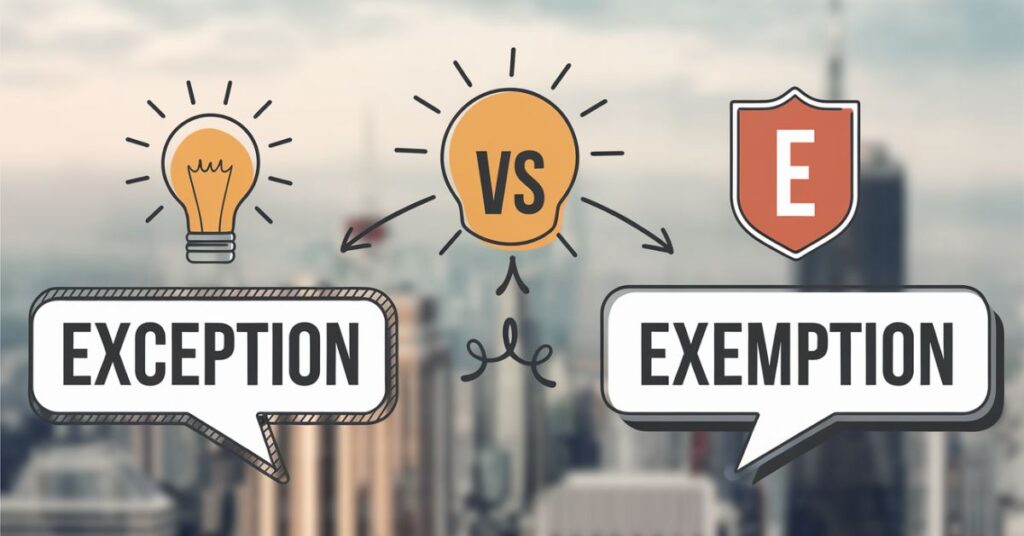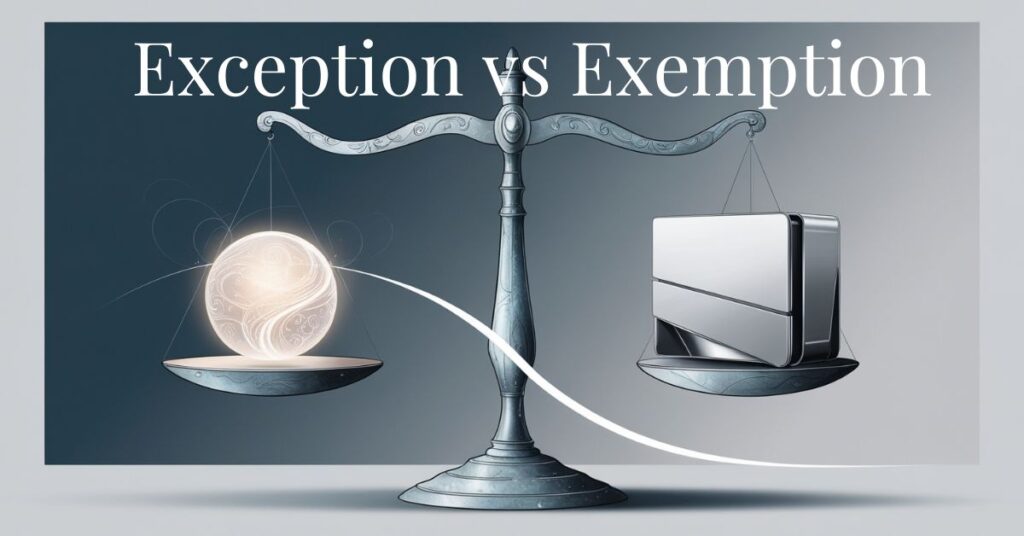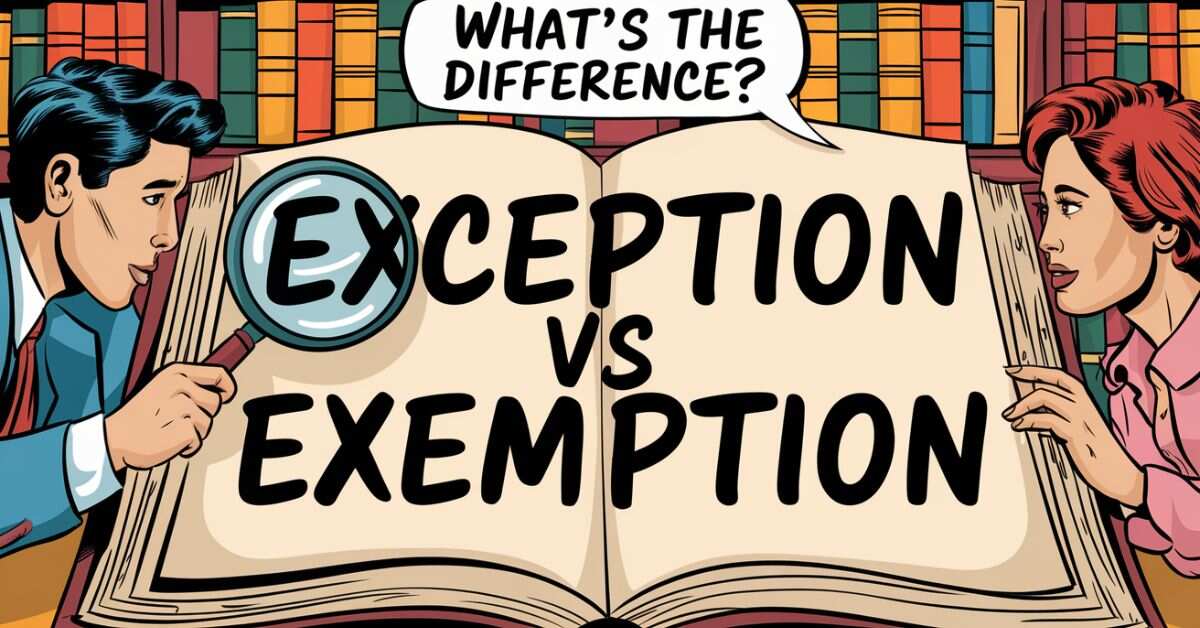“Exception vs exemption” are terms that often get mixed up. Both refer to situations where rules don’t apply, but they have different meanings. An exception is a case where something doesn’t follow the usual rule, while an exemption means being released from a rule or obligation.
Have you ever wondered why some people don’t have to follow certain rules? It’s because of exceptions and exemptions! Understanding the difference can clear up a lot of confusion and help you use these terms correctly.
Whether it’s tax exemptions or rule exceptions, these words are important in everyday language. Knowing when to use each can make your communication clearer. Let’s explore the meanings and differences between “exception” and “exemption” to get it right.
E-E-A-T FOR ME:
With 5 years of experience in grammar, I, Admin, provide accurate and reliable content. My expertise guarantees clear, top-quality insights. I focus on delivering well-optimized English for optimal understanding.
Understanding Exception vs Exemption

While the two words may sound similar, they represent fundamentally different concepts. The key to understanding the distinction lies in recognizing how each word relates to rules, obligations, and freedoms.
Exception generally refers to a situation where something doesn’t follow a general rule. It’s used when there’s a deviation from a norm or established pattern. For example, a rule that applies to everyone except a specific group of people, such as certain students or special cases.
Exemption, on the other hand, refers to being released from an obligation or duty that others are required to follow. It’s a form of relief from a responsibility, typically granted for specific reasons or conditions.
Let’s break down these concepts further by exploring their definitions and how they fit into everyday language.
Exception: Definition and Usage
What is an Exception?
An exception refers to a case or person that doesn’t fit within a general rule or standard. It highlights a deviation from the usual pattern or norm. In many contexts, exceptions are made to ensure fairness or accommodate unique circumstances. For example, a rule may apply to everyone except for a small number of individuals who have specific qualifications or situations.
Common Uses of Exception
- Legal Context: Laws and regulations often include exceptions to ensure that justice is applied fairly in all cases. For instance, certain rules around property tax exemptions allow exceptions for veterans or low-income individuals.
- Social Rules: In social settings, we often make exceptions for things like special occasions. A strict diet might have exceptions when a person celebrates a birthday or other significant event.
- Workplace and Education: Organizations and educational institutions may create exceptions to standard policies to address unique needs or situations, such as offering deadline extensions for students dealing with health problems.
5 Synonyms for Exception:
- Exclusion
- Outlier
- Anomaly
- Irregularity
- Deviation
These synonyms highlight different aspects of what it means to be an exception, whether it’s something that doesn’t conform to a pattern, or an event that stands out from the norm.
When to Use “Exception”
You should use exception when referring to a case or situation that doesn’t adhere to a general rule. It emphasizes the unique circumstances or deviation from an established norm. For instance, if you’re writing about a general rule and want to point out a case that doesn’t apply, you would say, “This rule applies to all students, with the exception of those who have completed the course.”
Exemption: Definition and Usage
What is an Exemption?
An exemption refers to the act of being excused from an obligation, duty, or responsibility that others are required to follow. This could apply to laws, policies, taxes, or even social duties. Exemptions are often granted based on specific qualifications or conditions, such as age, health, or status.
For example, a veteran might receive a tax exemption from certain property taxes, or a person could be granted an exemption from mandatory training due to health reasons.
Common Uses of Exemption
- Legal and Financial: One of the most common uses of exemption is in the realm of taxes. Tax exemptions allow certain individuals or groups to be relieved from paying specific taxes, such as property tax for veterans or tax exclusions for charitable organizations.
- Labor Law: In the workplace, exemptions may apply to certain employees, like those who are not required to follow overtime pay laws under the labor law due to their job status.
- Jury Duty: Certain individuals are exempt from jury duty based on age, health, or other special circumstances.
5 Synonyms for Exemption:
- Immunity
- Exclusion
- Dispensation
- Relief
- Pass
Each of these terms emphasizes the idea of being released from a duty, whether it’s a legal requirement, financial responsibility, or other obligations.
When to Use “Exemption”
You should use exemption when referring to the act of being excused or released from an obligation, responsibility, or rule that others are required to follow. It is often associated with legal or formal settings, where special qualifications allow a person to be relieved from an otherwise mandatory duty
Side-by-Side Comparison: Exception vs Exemption

To make things clearer, let’s look at a side-by-side comparison of exception and exemption based on various aspects:
| Aspect | Exception | Exemption |
|---|---|---|
| Meaning | Deviation from a norm or rule | Relief or freedom from an obligation or duty |
| Usage | Highlights irregularities or exclusions | Focuses on being excused from a duty or responsibility |
| Context | Can apply to rules, behaviors, or systems | Applies to legal, financial, or social obligations |
| Example | “The museum is open every day, with the exception of Mondays.” | “He was granted an exemption from paying taxes on his property.” |
This comparison table gives a quick glance at how these two words differ in meaning and usage.
Everyday Usage Examples
Let’s take a look at how exception and exemption fit into everyday language:
Exception Examples:
- Museum Exceptions: “The museum is open every day, with the exception of major holidays.”
- Dietary Exceptions: “I usually avoid caffeine, but I make an exception for coffee on special occasions.”
- Rule Deviations: “All students must submit the form by Friday, with the exception of those who are on leave.”
Exemption Examples:
- Tax Exemption: “Veterans can apply for a tax exemption on their property taxes.”
- Jury Duty Exemption: “He was granted an exemption from jury duty due to his health condition.”
- Work Exemption: “Certain employees are exempt from overtime pay under the labor law.”
FAQS: Exception vs Exemption
What is the difference between exemption and exception?
The main difference lies in what they describe. An exception refers to something or someone that deviates from a general rule, whereas an exemption refers to being excused from a specific obligation or duty that others must follow.
What are exceptions to exemptions?
While exemptions relieve individuals from a duty, there may be exceptions within exemptions. For example, a tax exemption may not apply to all individuals in a group, such as income caps for tax relief.
What is the meaning of exception?
An exception refers to a situation that doesn’t follow the usual rule or standard. It points to a case where the norm does not apply.
Is there an exemption or exception in every rule?
Not every rule has an exemption or exception. Some rules are meant to be absolute and don’t accommodate deviations or excused obligations.
When not to use exceptions?
Avoid using “exception” when you’re referring to someone being excused from a responsibility. In such cases, the correct term would be “exemption.”
Conclusion
Understanding the difference between exception vs exemption is key to avoiding common miscommunications. When you want to talk about a case that deviates from the general rule, exception is your word. But when someone is released from an obligation, exemption is the correct term. By choosing the right word, you’ll communicate more clearly, whether you’re talking about museum exceptions, tax exemptions, or even workplace rules.
Always remember to consider the context—whether it’s about a rule deviation or freedom from obligation—before selecting the appropriate term. With this guide, you should now be able to confidently use both words correctly, ensuring your communication is precise and effective.
With 5 years of experience in grammar, I, Admin, deliver accurate, clear, and reliable content. My expertise ensures top-quality insights in this niche.


PLz give me a time i will write this article with in 2 to 3 days